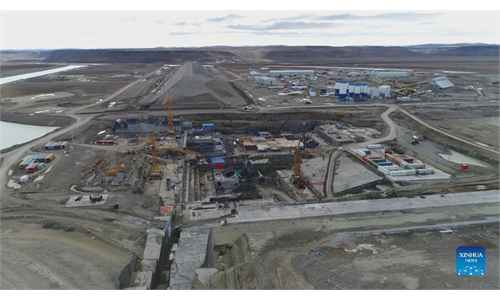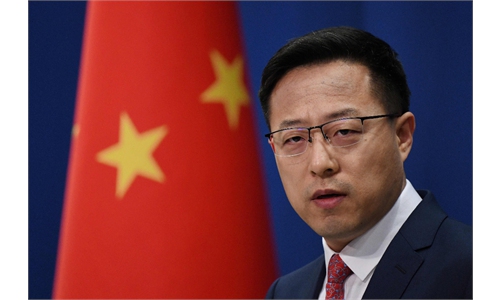
US,Latin America. Illustration: Xia Qing/GT
Editor's Note:China's diplomacy has always been based on the principle of equality between big and small countries. Global Times (GT) reporter Lu Yuanzhi talked to Lucas Llach (Llach), professor of the Department of History and Social Studies at the University of Ditra, Argentina and former vice president of the Central Bank of Argentina, on his understanding of China's diplomatic philosophy in comparison to US'.
GT: In your recent lecture at Tsinghua University, you mentioned that colonial plunder and imperialism have made Latin American development full of inequality and instability. Latin America is still deeply affected by US' interference. How do Latin American countries view unequal diplomatic relations with the US?
Llach: I'm not sure about that except for the colonial period. Already in the 19th century, some countries managed to take advantage of economic relationships with more powerful countries such as England in the 19th century, the US in the 20th and China in this century. Except during the Cold War, where political considerations were more important, in a peaceful world economic interaction is the crux of negotiations, and can produce gains in both sides of the diplomatic table.
GT: In February, Argentine President Alberto Fernandez visited Beijing and signed an MoU on the Belt and Road Initiative. In 2018, President Xi Jinping said that China is "to foster a China-Latin America relationship for the new era featuring equality, mutual benefit, innovation, openness and tangible benefits for the people." What do you think is the appeal of China's diplomatic philosophy to Latin American countries?
Llach: I think that, whatever the philosophy behind it, mutual interest is more about the potential mutual economic gains. In the case of China and Latin America, in spite of the distance there's a huge economic complementarity. China has been very keen in being a protagonist of this globalized world. China needs what Latin America has (ample natural resources); and China has what Latin America needs (savings to finance investment and an endless supply of manufacturing products in all degrees of sophistication).
GT: What changes in China over the past decade have left the deepest impression on you?
Llach: It was in the last decade that China surpassed the US in terms of total GDP measured in quantity of goods (still not in nominal dollars because the US is more expensive, on average, than China). That, of course, has a consequence in terms of their role in the world economy. As deputy governor of the Central Bank of Argentina I had the opportunity to participate in several G20 meetings, and what stroke me about China was the commitment to a free international flow of trade and finance, particularly compared to the US more protectionist stance during Trump's administration. I would like to see China keeping this role and I think it's positive both for China and for the rest of the world, in a context where in many Western countries (and Russia) a more nationalistic discourse is gaining hold.
GT: Both China and countries in Latin America are developing countries, encountering the common task of developing the economy and improving people's living standards. China has rich experience in poverty alleviation. What do you think Latin America can learn from China in this regard?
Llach: I'd say at least three things. One is that economic growth is a necessary condition for poverty alleviation. Another is that, on a longer term, an equal society is one with equal access to education. That is another thing I should point at when you ask me about what strikes me about China: educational results are amazing, both for their high level and their relative equality compared to other developing countries. And then inequality is not only about income, it's about opportunities in general. One place where inequality starts is in people's homes. In Latin America's big cities, we see a lot of slums, with poor construction and poor access to network services (water, sewages, gas and so on). The construction boom in China to house the growing middle class is something to imitate and it doesn't happen without proper policies.
GT: Washington has repeatedly expressed its "concern" over China's diplomatic exchanges and deeper cooperation with Latin America. What's your take on US politicians' finger-pointing on the normal exchanges between China and Latin American countries?
Llach: I believe in multilateralism and I think that both the US and China benefit from a deep economic interaction, be it between them or with other countries. Economic nationalism has been behind political nationalism in the past, and we don't want to go there. My view is that rather than any potential difference of viewpoints between China and the US, we should be more aware of anti-global and nationalist discourse both in the US, in China and elsewhere. That is the real danger.
GT: Former secretary of state John Kerry said in 2013 that the "era of the Monroe Doctrine is over." Is the US' current diplomacy toward Latin America a continuation of the Monroe Doctrine? Do you think the US still views its ties with Latin America with an imperialist and colonial mentality?
Llach: I'm not sure it's precise to use the words "colonialism" or "imperialism" for any sort of economic relationship between "big fish" and "small fish," unless the big fish wants to eat the small fish, which I don't think is the case here. In contrast to what happened until, say, the mid 19th century, when land and natural resources were the most valuable stuff a country could offer, nowadays wealth is embedded either in capital (factories and so on) or people (what we may call human capital). In that context, powerful countries do not necessarily have an interest in political domination over other countries with all the cost that entails; they just need for their investments there to be secure; and to have access to their resources through the peaceful expedient of international trade. At least since the end of the Cold War, American influence in Latin America has showed a tendency to support governments that promote international trade and investment; and to more or less subtly isolate governments that are nationalistic or anti-democratic (such as Maduro's government in Venezuela).
GT: Since the Ukraine crisis, most Latin American countries have refused to follow the US in imposing sanctions on Russia. What are the reasons? Is the US' "control" over the region in decline? What's your opinion on the waning of the US' appeal and influence in Latin America and other regions?
Llach: In general, trade with Russia is not very important for Latin American countries. The invasion of Ukraine by Russia was condemned by most Latin American countries and the US tried to influence governments in that direction. In any case, the fact that some chose another course of action shows that the influence of the US in the region is sometimes overestimated. I think that the US government does hold some important levers, for example in international financial institutions such as the IMF and the World Bank. But the increasingly multilateral character of trade and finance suggests that in the long run the influence of the US will be less than what it was in the 20th century.


